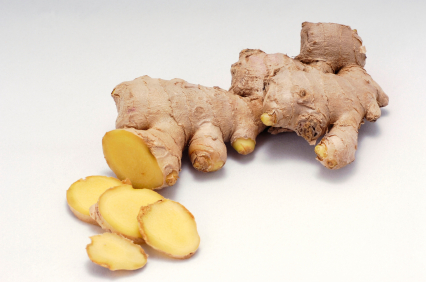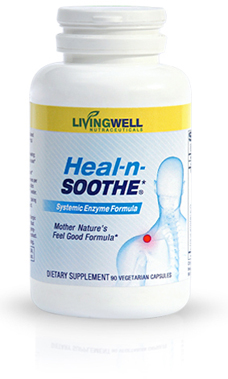 Chronic inflammation is one of the key reasons why people experience ongoing pain, and, unfortunately, it’s also incredibly common.
Chronic inflammation is one of the key reasons why people experience ongoing pain, and, unfortunately, it’s also incredibly common.
While acute inflammation helps your body to heal (after an injury, for instance), chronic inflammation contributes to diseases ranging from heart disease and cancer to rheumatoid arthritis and diabetes. As mentioned, it’s also often implicated in pain.
What causes chronic inflammation?
Stress and exposure to environmental toxins (like pollution or household chemicals) certainly contribute, but what you put in your body — your food and drinks, for instance — also play a major role.
Because of this, a comprehensive anti-inflammatory diet, consisting of inflammation-fighting food, drinks and herbal supplements — is an invaluable tool to help keep this pervasive health threat at bay.
A Comprehensive Anti-Inflammatory Diet in 10 Easy Steps
Food and Drinks
10. Fermented Foods
If you like the tangy flavor of traditionally fermented foods like kefir, sauerkraut and kimchi, you’re in luck, because these foods are an excellent source of beneficial bacteria known as probiotics. These good bacteria help to curb systemic inflammation in your body.[i]
Kefir, a fermented milk drink, in particular, contains not only probiotics but also anti-inflammatory prebiotics.[ii]
9. Tart Cherries
A glass of tart cherry juice a day may help keep the doctor away … that’s because tart cherries contain inflammation-fighting antioxidants known as anthocyanins. Tart cherries have been found to reduce numerous biomarkers of inflammation, including inflammation of abdominal fat, plasma and the heart.[iii]
 8. Blueberries
8. Blueberries
These unassuming nutritional powerhouses also contain antioxidants that offer a protective effect against inflammation. In fact, by adding blueberries to your morning smoothie (or simply eating them by the handful) daily for six weeks, you can increase anti-inflammatory molecules known as cytokines in your body![iv]
7. Broccoli
There’s a reason your mom always told you to eat your broccoli, and one of them has to do with the phytonutrients, such as sulphoraphane, that it contains. Sulphoraphane helps prevent the activation of inflammatory enzymes in your body in a way similar to anti-inflammatory drugs, but even better it also helps to keep inflammatory enzymes from increasing.[v]
6. Green Tea
Sipping on green tea is an excellent way to get more anti-inflammatory flavonoids into your diet. These natural compounds increase beneficial anti-inflammatory substances and decrease inflammatory ones,[vi] making green tea an ideal addition to your anti-inflammatory diet.
5. Nuts
If you want to naturally lower your risk of dying from an inflammatory disease, eat more nuts. These tasty snacks contain antioxidants, omega-3 fats, L-arginine and magnesium, which work together to modulate inflammation in your body.[vii]
Top Anti-Inflammatory Herbs and Enzymes
 4. Ginger
4. Ginger
Whether steeped in tea or grated over your stir-fry, ginger has potent anti-inflammatory benefits, and actually shares pharmacological properties with non-steroidal anti-inflammatory drugs (without all of the side effects).[viii]
3. Boswellia (Indian Frankincense)
Boswellia, a natural inflammation-fighting gum resin extract derived from the Boswellia serrata tree, common to India, fights inflammation as well as most NSAID drugs, but without the stomach irritation or ulceration. Its benefits are due to a mixture of naturally occurring organic acids, which inhibit pain and inflammation-causing enzymes.
2. Turmeric
The yellow spice most well-known for its use in Indian curry dishes, turmeric is a powerful anti-inflammatory. Curcumin, its active ingredient, has been shown to work as well as ibuprofen in treating pain, such as that from knee osteoarthritis.[ix]
1. Proteolytic Enzymes
Proteolytic enzymes, or proteases, are different from, say, digestive enzymes, because they enter your circulatory system and work throughout your entire body. They are “systemic” enzymes with a number of important purposes, including breaking down excess fibrin, a natural substance that helps your body with wound healing, but which often builds up in your body, causing additional inflammation and pain.
As Steven Hefferon, CMT, PTA, CPRS, noted:
“Some possible indicators of excess fibrin in your system include: chronic fatigue, slow healing, inflammation and pain, and elevated blood pressure.
… The medical community has long known that excess fibrin presents a cardiac and stroke risk. Finally, they have acknowledged a link between excess fibrin and chronic systemic inflammation, the true root cause of virtually every disease and painful condition know to man.”
 Proteolytic enzymes are essential for fighting chronic inflammation that has built up in your body, but your body stops producing optimal amounts of proteolytic enzymes sometime in your late 20s, which is why taking a proteolytic enzyme supplement is a very smart move. Heal-n-Soothe® is our top-recommended solution, providing you pure and powerful proteolytic enzymes … along with 11 OTHER natural anti-inflammatories (including ginger, boswellia and turmeric) for long lasting pain relief and for fighting all sorts of inflammation quickly and effectively.
Proteolytic enzymes are essential for fighting chronic inflammation that has built up in your body, but your body stops producing optimal amounts of proteolytic enzymes sometime in your late 20s, which is why taking a proteolytic enzyme supplement is a very smart move. Heal-n-Soothe® is our top-recommended solution, providing you pure and powerful proteolytic enzymes … along with 11 OTHER natural anti-inflammatories (including ginger, boswellia and turmeric) for long lasting pain relief and for fighting all sorts of inflammation quickly and effectively.


Very informative and I am a fan. My family has purchased a couple items from you. Thanks for the input.
Well I have arthritist in my knees hands legss mostly fibromylgia and I ve. Tried some of these suggestions and as for. Do they work well I’m not quite sure mayb a little but whe. The fibromligai kicks in its nothing short of bbeng in hell. I take meds for pain and ibprofen wow busies from the ibprofen so I need something to calm all of this down walking stairs is so. Hurtful omg I need to try something that works on the joints if u know of something plz use my e mail and let me know thank u Barb.
do you take a boron supplement?
Is heal and soothe like serrapeptase?
Lisa, Yes the enzymes in Heal n Soothe and Serrapeptase are both proteolytic enzymes, meaning they both break down proteins, one of the differences between them is the source of the enzymes, Serrapeptase comes from the silk worm and the enzymes in Heal n Soothe come from Mushrooms and fruits.
Now the benefit to taking enzymes that do not come from animal source is that they can live in a wider pH range, in the stomach, intestinal track and even in the blood without having to be coated with a protected glue other wise know as enterically coated.
We choose to produce Heal n Soothe with enzymes that did not need to be enterically coated and we are glad we did as our results have been fantastic since 2007…
Steve
Barbara,
I suggest that you do some reading, hear are some really good books, that have an apporach to pain and Fibro that im very confident that you Drs have not addressed with you…
a. Why we hurt, by Greg Fors suggest Amazon
b. 7 Day Back Pain Cure, By Jesse Cannone
c. The Cure for all Diseases By Hulda Dr Clark
I have your email I will send you some links to help you get started
Steve
You have a lot of interesting information. It refirms what my chiropractor has been helping me with
for over 20 years. Thank you. Mary Myers
I like it
Barbara Winslow – You may want to try Comfrey Leaf Tea. Ages ago comfrey leaf tea was called “knit bone” due to its incredible powers of healing broken bones and torn cartilage. Some recommend two or three cups of comfrey leaf tea a day for several months to resolve joint pain issues. Worth a try maybe?
I have suffered nightly for the past two years with nerve spasm in lower leg EVERY night. I have arthritis in both knees. I have eaten 1/4 cup of blueberries with pecans, & rice cereal EVERY morning for 5 years, one month ago I stopped blueberries and substituted to strawberries. so thankful to report I have not had one single spasm, have slept all night and feel so normal and happy to be alive. no more blueberries EVER for me.
I am taking hydroxyurea 500 mg once a day and allopurinol 10mg twicea day. Don’t you think heal &soothe won’t contraindicate with these meds? I have asked my oncologist but she does not want to comment since it’s not FDA approved ( you know nost of the doctors).
Hi Mona! The only medications that Heal-n-Soothe contraindicates with are prescription blood thinners and Antibiotics. Other than those two, Heal-n-Soothe is safe to take with other medications.